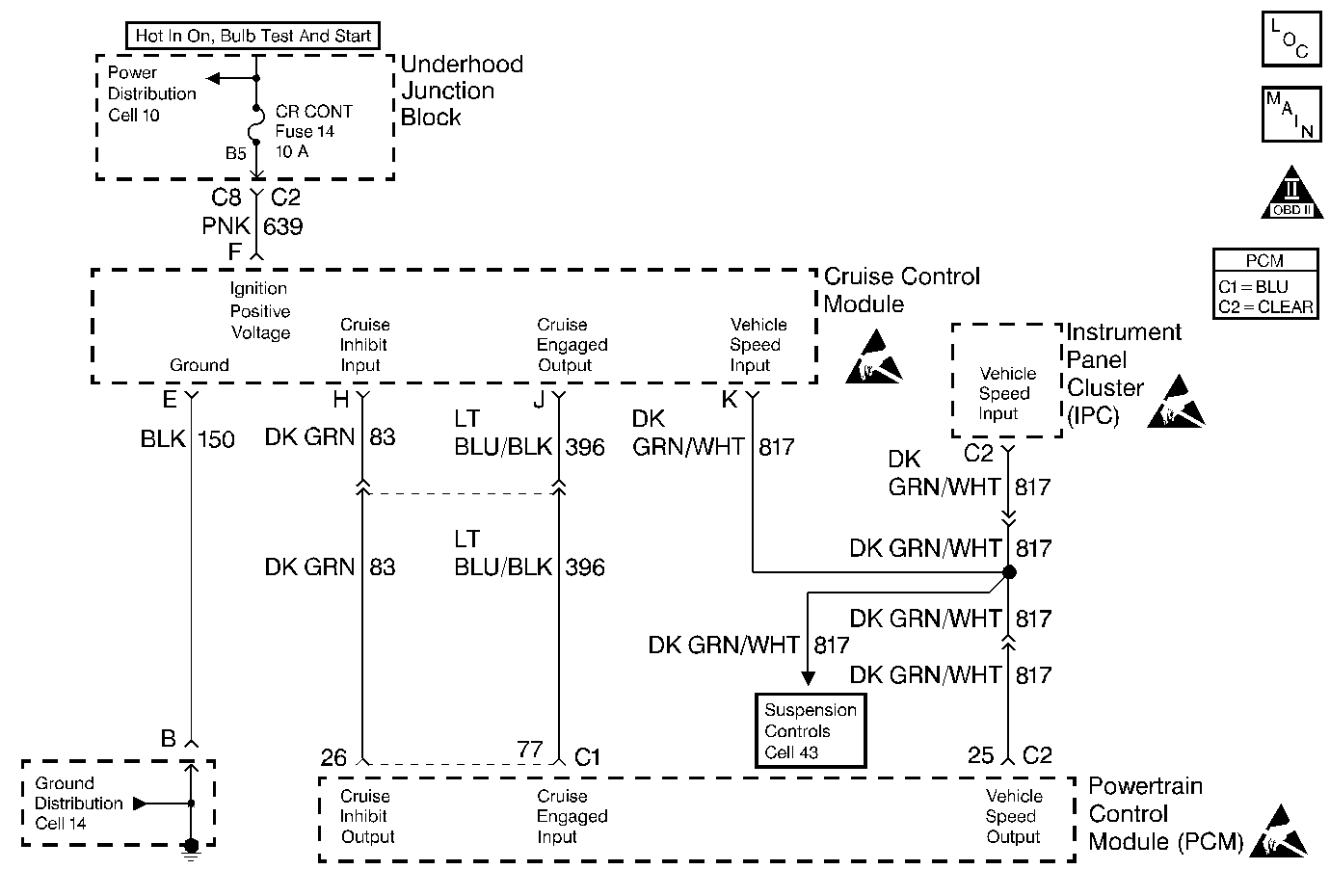
Circuit Description
The PCM contains chips called Output Driver Modules that provide 7 switchable ground outputs for operating solenoids, relays, telltales, and other devices. Each of these ground outputs has an internal fault line that feeds back to the PCM's microprocessor. When the output is OFF, the output driver should receive the 12 volts fed to the solenoid, relay, etc. When the output is ON, it should receive 0 volt since it is grounding the output. If it receives 0 volt when the output is OFF or 12 volts when the output is ON, it sets the fault line low. DTC P1654 is used to monitor the fault line of the cruise disable output to the cruise control module. The cruise control module sends 12 volts on CKT 83 to the PCM. The PCM will then ground this circuit to have cruise control module disengage if engaged or inhibit cruise operation if requested.
Conditions for Running the DTC
| • | DTC 1650 not set. |
| • | Engine running for at least 10 seconds. |
Conditions for Setting the DTC
Fault line is low for 2 seconds.
Action Taken When the DTC Sets
| • | The Malfunction Indicator Lamp (MIL) will not illuminate. |
| • | No message will be displayed. |
Conditions for Clearing the DTC
| • | A History DTC will clear after forty consecutive warm-up cycles with no failures of any non-emission related diagnostic test. |
| • | A Last Test Failed (current) DTC will clear when the diagnostic runs and does not fail. |
| • | Use a scan tool to clear DTCs. |
| • | Interrupting PCM battery voltage may or may not clear DTCs. This practice is not recommended. Refer to Clearing Diagnostic Trouble Codes in PCM Description and Operation. |
Diagnostic Aids
Use the Failure Rec. to aid in diagnosing an intermittent fault. Use the data captured when the DTC set to determine if an open or shorted condition caused the DTC to set.
Step | Action | Value(s) | Yes | No |
|---|---|---|---|---|
1 | Did you perform the Powertrain On-Board Diagnostic (OBD) System Check? | -- | ||
2 |
Does the display indicate OK? | -- | ||
3 |
Is the voltage the same or more than the value specified? | 10.0 volts | Fault not present. Refer to Diagnostic Aids | |
4 |
Is the resistance the same or less than the value specified? | 5 ohms | ||
5 | Measure the resistance between cruise control module connector terminal H (harness side) and PCM connector C1 terminal 26. Is the resistance the same or less than the value specified? | 5 ohms | ||
6 |
Is the voltage the same or more than the value specified? | 10.0 volts | ||
7 |
Is the voltage the same or more than the value specified? | 10.0 volts | ||
8 | Repair short to ground on the cruise inhibit output circuit. Is the repair complete? | -- | Go to Powertrain Control Module Diagnosis for Verify Repair | -- |
9 | Repair the open in the cruise inhibit output circuit. Is the repair complete? | -- | Go to Powertrain Control Module Diagnosis for Verify Repair | -- |
10 | Repair the short to voltage on the cruise inhibit output circuit. Is the repair complete? | -- | Go to Powertrain Control Module Diagnosis for Verify Repair | -- |
11 | Repair open or short to ground (blown fuse) in the ignition feed to the cruise control module. Is the repair complete? | -- | Go to Powertrain Control Module Diagnosis for Verify Repair | -- |
12 |
Was terminal contact repaired? | -- | Go to Powertrain Control Module Diagnosis for Verify Repair | |
13 | Replace the cruise control module.Go to Cruise Control Module Replacement for repair instructions. Is the replacement complete? | -- | Go to Powertrain Control Module Diagnosis for Verify Repair | -- |
14 |
Was terminal contact repaired? | -- | Go to Powertrain Control Module Diagnosis for Verify Repair | |
15 | Replace the PCM. Refer to Powertrain Control Module Replacement . Is the replacement complete? | -- | Go to Powertrain Control Module Diagnosis for Verify Repair | -- |
